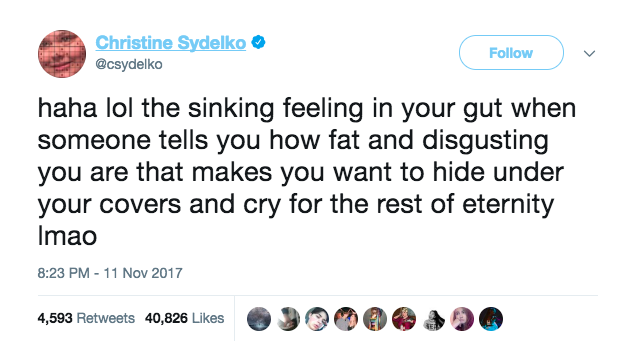“Ugh, I am so fat” is a phrase that has likely been uttered by everyone, ever. Whether it’s because you don’t like how you look in a certain outfit or you just consumed too much pizza, chances are you’ve said it. Erase it from your vocabulary.
There is absolutely nothing wrong with being fat. It’s just another way to be, a body type just like skinny, muscular, lanky, athletic, petite or anything else, and it is not inherently negative.
I have been fat for the majority of my life. I know how much it hurts to listen to friends in size two dresses crying over how “fat and disgusting” they look, because it only leads me to wonder, ‘If she thinks she’s disgusting … what does she possibly think about me?’
I also know body image is a very nuanced topic; my friends don’t actively think any less of me because I’m bigger than they are, and people look at their own bodies from an entirely different perspective than they look at the bodies of others. That doesn’t mean language can’t hurt.
Actively choosing to say “I don’t like the way I look right now,” or “I feel uncomfortable with my body today,” instead of “I look/feel/am so fat,” is an easy change with positive results. In doing so, you stop yourself from constantly associating fatness with negativity, and you make the fat people in your life generally feel more safe and comfortable.
Fat people deserve better in the realm of pop culture, too. Popular comedic content creator Christine Sydelko frequently discusses being the victim of fat-shaming, sometimes taking to YouTube or Twitter to open up about her experiences.
Sydelko was recently featured in the music video for Katy Perry’s “Swish Swish,” in which she was given the nickname “Shaquille O’Meals.” Initially, she made a vlog-style response to the video, saying it didn’t bother her much, but later she took to Twitter to express otherwise.
haha lol the sinking feeling in your gut when someone tells you how fat and disgusting you are that makes you want to hide under your covers and cry for the rest of eternity lmao
— Christine Sydelko (@csydelko) November 12, 2017
no but really what is so wrong with being fat? why do I deserve to feel like I’m worthless? because my ass is big?? fuck that
— Christine Sydelko (@csydelko) November 12, 2017
it just really sucks when no one can see past your physical appearance like I got to be in a Katy Perry music video which I was really excited about and then of course it turned out to be one big fat joke at my expense because why wouldn’t it
— Christine Sydelko (@csydelko) November 12, 2017
Sydelko’s critics often come for her appearance, not her content. In tweeting “Why do I deserve to feel like I’m worthless? Because my ass is big??” she made an important point — there is nothing about her body that makes her less of a person, worse at her job or less worthy of praise and success. Her body is just large — that’s it. She is worthy of all the same things a small person is, and I don’t think many would disagree with that statement.
A lot of the time, though, the same people who come together to support women like Sydelko and Gabourey Sidibe and Aidy Bryant use the term “fat” to put themselves down. It’s contradictory to outwardly support fat women and continually uphold the stigmatized language that oppresses them every day.
The best way to really support fat people — not just famous fat people, but the people that end up appearing in derogatory memes or receiving judgmental stares in restaurants — is to police the way you speak about their body type.
If you really think there is nothing wrong with being fat — and you really should think that — then stop speaking like being fat would ruin you. There are better ways to articulate body insecurities.



